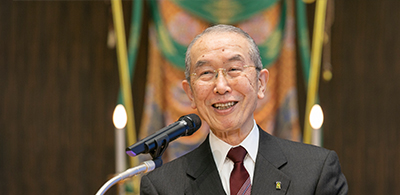The Key Phrase of Our Time Is “Benefitting Others”—Donation, Part 1
January 2022

The Key Points of Buddhism
Happy New Year, everyone.
At present the coronavirus has still not gone away; it continues to cause anxiety but, in the course of the pandemic, we have learned many things, haven’t we? This year, let’s apply that learning to the workings of wisdom and compassion and, as bodhisattvas who create peaceful homes and welcoming communities, steadfastly continue our diligent practice.
Well, then, for we who are studying the teachings of the Buddha, what teaching and diligent practice are the most important?
To quote Saicho (767–822), the founder of the Japanese Tendai school, “The ultimate form of compassion is taking unpleasant things for yourself while giving better things to other people, that is, forgetting about yourself and benefitting others.” He taught us that those who do so are bodhisattvas with such will to pursue the Way and are the treasures of the nation. “Forgetting about yourself and benefitting others” means practicing compassion by being considerate of other people and doing whatever you can to bring them peace of mind and joy—and that is the practice of donation, the most important teaching in the Buddha Way. Kukai (774–835), the founder of the Japanese Shingon school, said that, “Shakyamuni’s teachings are vast and without limit, but to express them succinctly in a single phrase, they are ‘benefitting oneself and others.’” Kukai thus advises us that the key points of Buddhism are donation (benefitting others), which is one of the Six Paramitas, and becoming a buddha in your present body (benefitting oneself), just as you are.
If you think about it, when Shakyamuni renounced his home and family, his motive was to “liberate living beings, having seen how they strayed from the right path and suffered in the cycles of birth and death” (Shoko Watanabe, Shin Shakuson den [A new biography of Shakyamuni Buddha]). Shakyamuni cast aside his position and wealth as the prince of his own country in order to devote himself to seeking the wisdom (awakening) to liberate all people from suffering. Because of this mind of benefitting others, this practice of donation, there is the Buddha Way. I think that donation being the first of the Six Paramitas—the perfections of a bodhisattva’s practice—is not unrelated to the particular circumstance of Shakyamuni’s renouncing his princely birth.
In this sense as well, while many of our values are now at a turning point, let’s consider what is important for us to accept from the practice of donation as well as the teaching of the Six Paramitas.
Having No Greedy Desire Is a Practice of Benefitting Others
In spite of the trend of physical and emotional distancing between people due to COVID-induced social restrictions, the practice of benefitting others in ways that transcend personal interests, regardless of whether such practice is part of one’s faith or not, has attracted public attention in recent years. I think it is truly wonderful that more and more people are experiencing joy and a sense of accomplishment and purpose by using what they have for the sake of others through volunteer activities, support of local shops and businesses, and altruistic crowdfunding—thereby broadening and enriching people’s minds.
We hear a lot about the coronavirus “disaster,” but if the spread of an infectious disease has led to refining the mindset of people helping each other, then the coronavirus is the cause, producing what we could call “the coronavirus effect,” and we can see the disease as something that also has a positive dimension. In Buddhism, we are taught that donation can take the form of donating material goods, donating (sharing) the teachings with others, and donating oneself (one’s physical abilities) or donating fearlessness (freeing people from anxiety or fear). However, if we rephrase these as contributing to society, helping others, and doing volunteer work, it seems we can all find a way of practicing donation and benefitting others that is well-suited to each of us. Furthermore, Zen master Dogen (1200–1253) said, “donation means having no greedy desires.” In other words, if you have no greedy desire, whatever you do not eat or use reaches other people, which is itself a form of donation. In addition, when we think about a sustainable environment and society, we could say that the effort of every single person to practice benefitting others by having no greedy desire is a more contemporary, thought-provoking teaching.
On the other hand, we can take the point of view that as people interact with each other less frequently, they have difficulty showing the mind of compassion that takes action when someone in front of them is in trouble.
Therefore, as it is all the more important to be kind to others, I would like to again reconsider, together with all of you, such matters as the mind of donation and the relationship between attachment to desires and material donations.




